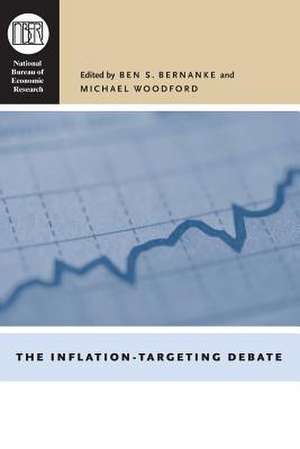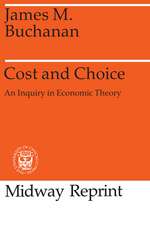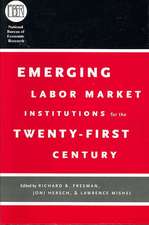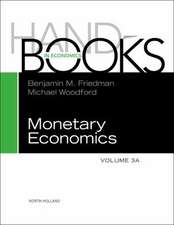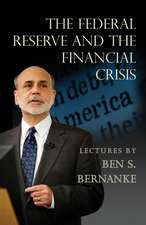The Inflation-Targeting Debate: National Bureau of Economic Research Studies in Business Cycles, cartea 32
Editat de Ben S. Bernanke, Michael Woodforden Limba Engleză Paperback – noi 2006
Over the past fifteen years, a significant number of industrialized and middle-income countries have adopted inflation targeting as a framework for monetary policymaking. As the name suggests, in such inflation-targeting regimes, the central bank is responsible for achieving a publicly announced target for the inflation rate. While the objective of controlling inflation enjoys wide support among both academic experts and policymakers, and while the countries that have followed this model have generally experienced good macroeconomic outcomes, many important questions about inflation targeting remain.
In Inflation Targeting, a distinguished group of contributors explores the many underexamined dimensions of inflation targeting—its potential, its successes, and its limitations—from both a theoretical and an empirical standpoint, and for both developed and emerging economies. The volume opens with a discussion of the optimal formulation of inflation-targeting policy and continues with a debate about the desirability of such a model for the United States. The concluding chapters discuss the special problems of inflation targeting in emerging markets, including the Czech Republic, Poland, and Hungary.
In Inflation Targeting, a distinguished group of contributors explores the many underexamined dimensions of inflation targeting—its potential, its successes, and its limitations—from both a theoretical and an empirical standpoint, and for both developed and emerging economies. The volume opens with a discussion of the optimal formulation of inflation-targeting policy and continues with a debate about the desirability of such a model for the United States. The concluding chapters discuss the special problems of inflation targeting in emerging markets, including the Czech Republic, Poland, and Hungary.
Preț: 393.37 lei
Nou
Puncte Express: 590
Preț estimativ în valută:
75.27€ • 78.79$ • 62.65£
75.27€ • 78.79$ • 62.65£
Carte tipărită la comandă
Livrare economică 01-15 aprilie
Preluare comenzi: 021 569.72.76
Specificații
ISBN-13: 9780226044729
ISBN-10: 0226044726
Pagini: 468
Ilustrații: 44 line drawings, 38 tables
Dimensiuni: 152 x 229 x 28 mm
Greutate: 0.63 kg
Editura: University of Chicago Press
Colecția University of Chicago Press
Seria National Bureau of Economic Research Studies in Business Cycles
ISBN-10: 0226044726
Pagini: 468
Ilustrații: 44 line drawings, 38 tables
Dimensiuni: 152 x 229 x 28 mm
Greutate: 0.63 kg
Editura: University of Chicago Press
Colecția University of Chicago Press
Seria National Bureau of Economic Research Studies in Business Cycles
Notă biografică
Ben S. Bernanke is the Howard Harrison and Gabrielle Snyder Beck Professor of Economics and Public Affairs at Princeton University. He is a member of the board of governors of the United States Federal Reserve System, coauthor of two economics textbooks and of Inflation Targeting: Lessons from the International Experience. Michael Woodford is the Harold H. Helm ’20 Professor of Economics and Banking at Princeton University. He is the author of Interest and Prices: Foundations of a Theory of Monetary Policy and coeditor of the Handbook of Macroeconomics and Knowledge, Information, and Expectations in Modern Macroeconomics.
Cuprins
Acknowledgments
Introduction
Ben Bernanke and Michael Woodford
1. What Has Inflation Targeting Achieved?
Mervyn King
I. Optimal Targets
2. Implementing Optimal Policy through Inflation-Forecast Targeting
Lars E. O. Svensson and Michael Woodford
Comment: Bennett T. McCallum
Discussion Summary
3. Optimal Inflation-Targeting Rules
Marc P. Giannoni and Michael Woodford
Comment: Edward Nelson
Discussion Summary
4. Inflation Targeting, Price-Path Targeting, and Output Variability
Stephen G. Cecchetti and Junhan Kim
Comment: N. Gregory Mankiw
Discussion Summary
5. Imperfect Knowledge, Inflation Expectations, and Monetary Policy
Athanasios Orphanides and John C. Williams
Comment: George W. Evans
Discussion Summary
II. Critical Perspectives
6. Does Inflation Targeting Matter?
Laurence Ball and Niamh Sheridan
Comment: Mark Gertler
Discussion Summary
7. Limits to Inflation Targeting
Christopher A. Sims
Comment: Stephanie Schmitt-Grohé
Discussion Summary
8. Inflation Targeting in the United States?
Marvin Goodfriend
Comment: Donald L. Kohn
Discussion Summary
III. Inflation Targeting for Emerging Markets
9. Inflation Targeting in Transition Economies: Experience and Prospects
Jiri Jonas and Frederic S. Mishkin
Comment: Olivier Blanchard
Discussion Summary
10. Inflation Targeting and Sudden Stops
Ricardo J. Caballero and Arvind Krishnamurthy
Comment: Ben S. Bernanke
Discussion Summary
Contributors
Author Index
Subject Index
Introduction
Ben Bernanke and Michael Woodford
1. What Has Inflation Targeting Achieved?
Mervyn King
I. Optimal Targets
2. Implementing Optimal Policy through Inflation-Forecast Targeting
Lars E. O. Svensson and Michael Woodford
Comment: Bennett T. McCallum
Discussion Summary
3. Optimal Inflation-Targeting Rules
Marc P. Giannoni and Michael Woodford
Comment: Edward Nelson
Discussion Summary
4. Inflation Targeting, Price-Path Targeting, and Output Variability
Stephen G. Cecchetti and Junhan Kim
Comment: N. Gregory Mankiw
Discussion Summary
5. Imperfect Knowledge, Inflation Expectations, and Monetary Policy
Athanasios Orphanides and John C. Williams
Comment: George W. Evans
Discussion Summary
II. Critical Perspectives
6. Does Inflation Targeting Matter?
Laurence Ball and Niamh Sheridan
Comment: Mark Gertler
Discussion Summary
7. Limits to Inflation Targeting
Christopher A. Sims
Comment: Stephanie Schmitt-Grohé
Discussion Summary
8. Inflation Targeting in the United States?
Marvin Goodfriend
Comment: Donald L. Kohn
Discussion Summary
III. Inflation Targeting for Emerging Markets
9. Inflation Targeting in Transition Economies: Experience and Prospects
Jiri Jonas and Frederic S. Mishkin
Comment: Olivier Blanchard
Discussion Summary
10. Inflation Targeting and Sudden Stops
Ricardo J. Caballero and Arvind Krishnamurthy
Comment: Ben S. Bernanke
Discussion Summary
Contributors
Author Index
Subject Index
